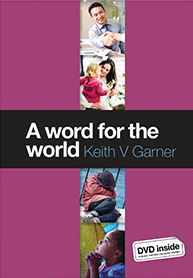 A review of A Word for the World by Keith V. Garner. Published by Mediacom.
A review of A Word for the World by Keith V. Garner. Published by Mediacom.
Keith Garner is the dynamic leader of Wesley Mission in Sydney, one of Australia’s largest charities, with its special focus on community and care. Garner’s role includes pastoring the largest Uniting Church parish in Australia, and he is recognised in the foreword by Mark Scott, CEO of the ABC, as an inspired preacher. This book consists of a series of edited sermons, summarising Garner’s message to the world.
The sermons are collected under four topic areas: Success, Sorrow, Society and Spirituality, which Garner identifies as major themes relevant for the church and beyond in these “uncertain” times. What is consistent is Garner’s faithfulness to the Word of God, and each sermon is authentically based on the Bible, which Garner sees as powerful to speak into our human situation.
The book includes a DVD with four interviews conducted by Garner matching the topic areas. Nick Farr-Jones, ex-Australian Rugby captain, reflects on success, and failure; Leigh Hatcher, TV journalist and presenter of the national radio program Open House, makes comments about sorrow, including sharing about his own journey with chronic fatigue; Tanya Plibersek MP, currently Minister for Health and Medical Research, considers the challenges of being part of society; and Margaret Somerville, a national treasure and MBE, speaks enthusiastically about the significance of spirituality, and especially an intimate relationship with God.
It took me a little while to get into this book: it would have been helpful to have an introduction to each topic, as well as links between the various sermon outlines to explain their flow. However there are some real jewels here, including the sermon on depression, based on Psalm 42, which looks at different “rungs” for climbing out of the “mire”, including self-examination and understanding, memory and the rung of God’s presence.
I also enjoyed the examination of environment in the Society section with its common Christian myths: that nature exists solely for our delight and use, the fear that identification with nature leads to pantheism, and the view of the natural world as a sphere of profanity and darkness. Garner articulately dismisses all three on biblical evidence.
In the section on Spirituality, Garner gives a wonderful sermon on the priority of prayer, based on Isaiah 55:6-9. He explains that prayer is God’s gift to a thirsting heart, God’s challenge to a thinking mind, and God’s warning to the flippant.
There are also some thought-provoking quotes, like the challenge of Micah toward shallow religion, which Garner summarises as “buying into it if we like it, ducking out of church if it doesn’t suit, and disengaging with human need as a matter of choice”.
Garner also collects great quotes from other Christian writers that are sprinkled throughout the book. I especially liked the following from Paul Tillich: “Eternal joy … is attained by breaking through the surface, by penetrating the deep things of ourselves, or our world, and of God … For in the depth is truth, and in the depth is hope, and in the depth is joy.”
If I had to sum up Garner’s view it would be that he desperately wants the church to be a prophetic voice to the world, engaging with its pain, and bringing the wisdom of God’s word to its confusion, and the hope of Christ’s redemption to the mess of individual lives and society.
He believes the church can regain its prophetic edge by:
- not becoming infatuated with the modern obsession with success
- refusing to see Christian relevance as about glitzy presentation
- nurturing leaders who see the whole gospel as being the offer of salvation and the questioning of the world in which we live
- lifting our voice from a particular political ideology, being free to question all
- challenging issues of context in all places where Christians live, work and serve.
This book is a useful resource for individual reflection, small group studies, or within a wider church context. It is much richer in content than its plain cover or production would suggest. Keith Garner has left a worthy legacy of his work, in which he models the prophetic gospel message.
KARA MARTIN is the Associate Dean of the Marketplace Institute, Ridley Melbourne, has been a lecturer with School of Christian Studies, and Wesley Institute and is an avid reader and book group attendee. Kara does book reviews for Hope 103.2’s Open House.
Email This Story
Why not send this to a friend?



